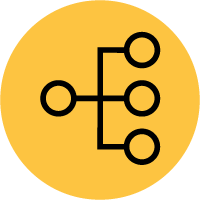„Teacher well-being is crucial not only for the health of educators themselves but also for maintaining the quality of education.“
– OECD, 2021
What does it mean for a teacher to truly thrive, not just survive the day? This module offers a foundation for understanding teacher well-being: what it is, why it matters, and how it can be supported.
You’ll explore key models and definitions of well-being, the factors that influence it, from personal habits to systemic structures, and why teacher well-being is central to both job satisfaction and student success.
This module lays the groundwork for all following in-depth modules. Completing it first ensures a shared understanding of core concepts and a common language around teacher well-being.
 In this module, you will…
In this module, you will…
 In this module, you will…
In this module, you will…
- explore basic concepts related to teacher well-being.
- relate teacher well-being to influential factors.
- approach different models explaining teacher well-being.
- understand the implications of teacher well-being in teaching and job satisfaction.
 How to work on this Learning Module – Instructions
How to work on this Learning Module – Instructions
 How to work on this Learning Module – Instructions
How to work on this Learning Module – Instructions
Whether you are working on this module individually or in a group, you will encounter several reflection and transfer questions.
 This icon marks activities and tasks for individual learners.
This icon marks activities and tasks for individual learners.
For individual learners, we recommend
- to find a designated space where you collect your key ideas and findings: a notebook, a digital tool (i.e. Padlet, Miro, OneNote, …), etc. (in addition to your Action Plan (read below)).
- if you know of a colleague who completed the same modules like you, to find an opportunity to meet up and share your results (or Action Plans (read below)) with each other.
 This icon marks activities and tasks for groups.
This icon marks activities and tasks for groups.
For groups, we recommend
- to set up an Idea Hub – for example, a white board, a poster, a table, a digital pinboard (i.e. Padlet, Miro), where you collect key ideas and findings. Decide for yourselves whether, after completing the module, the Idea Hub is meant for your group’s eyes only or if you would like to share or even present your work and experience (e.g. in the teacher’s lounge, during a conference, etc.).
- in addition to each learner’s individual Action Plan, to consider setting up a Group Action Plan which can be added to the aforementioned Idea Hub.
![]() This icon marks an Action Plan activity to connect ideas with your own context in your personal Teacher Well-being Action Plan (see download link below).
This icon marks an Action Plan activity to connect ideas with your own context in your personal Teacher Well-being Action Plan (see download link below).
 Download: Action Plan template „Introduction & Foundations“
Download: Action Plan template „Introduction & Foundations“
 Download: Action Plan template „Introduction & Foundations“
Download: Action Plan template „Introduction & Foundations“
Download your template for the Action Plan „Introductions & Foundation“ here.
Whenever you encounter an „Action Plan“ icon in this module,
- follow the instructions and fill in the corresponding section in your Action Plan.
- You do not need to have all the answers right away – the plan is meant to evolve with your learning!
Funded by the European Union. Views and opinions expressed are however those of the author(s) only and do not necessarily reflect those of the European Union or the European Education and Culture Executive Agency (EACEA). Neither the European Union nor EACEA can be held responsible for them.

